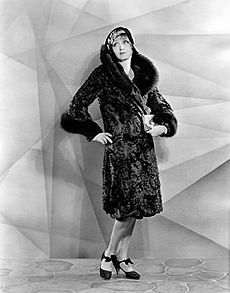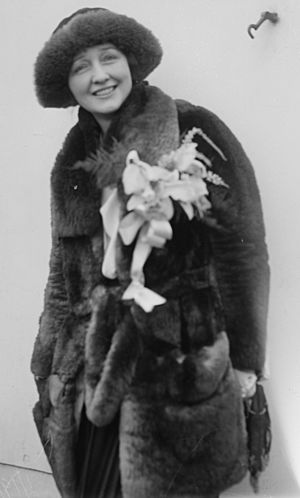Hedda Hopper facts for kids
Quick facts for kids
Hedda Hopper
|
|
|---|---|
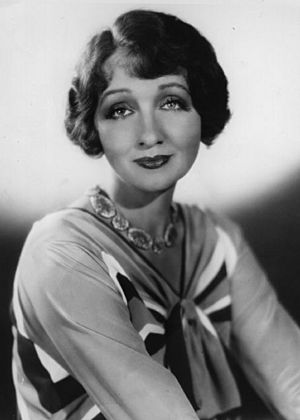
Hopper in 1930
|
|
| Born |
Elda Furry
May 2, 1885 |
| Died | February 1, 1966 (aged 80) Los Angeles, California, U.S.
|
| Resting place | Rose Hill Cemetery in Altoona, Pennsylvania |
| Occupation | Actress, gossip columnist |
| Years active | 1908–1966 |
| Known for | Writing "Hedda Hopper's Hollywood" |
| Political party | Republican |
| Spouse(s) |
DeWolf Hopper
(m. 1913; div. 1922) |
| Children | William Hopper |
Hedda Hopper (born Elda Furry; May 2, 1885 – February 1, 1966) was an American gossip columnist and actress. At the height of her influence in the 1940s, her readership was 35 million. A strong supporter of the House Un-American Activities Committee (HUAC) hearings, Hopper named suspected communists and was a major proponent of the Hollywood blacklist. Hopper continued to write gossip until the end of her life, her work appearing in many magazines and later on radio. She had an extended feud with another gossip columnist, arch-rival Louella Parsons.
Contents
Early life
Hopper was born Elda Furry in Hollidaysburg, Pennsylvania, the daughter of Margaret (née Miller; 1856–1941) and David Furry, a butcher, both members of the German Baptist Brethren. Her family was of Pennsylvania Dutch (German) descent. The family moved to Altoona when Elda was three.
Career
Acting
She eventually ran away to New York City and began her career in the chorus on the Broadway stage. Hopper was not successful in this venture. Florenz Ziegfeld called the aspiring starlet a "clumsy cow" and brushed off her pleas for a slot in his lavish Follies. After a few years, she joined the theater company of matinee idol DeWolf Hopper, whom she called "Wolfie" and would later marry.
She remained in the chorus and they toured the country. While in the Hopper company, she realized that chorus and understudy jobs were not acting. She wanted to act, and she knew she would have to prove herself before she could hope to get anywhere in the theater. Hearing that Edgar Selwyn was casting his play The Country Boy for a road tour, she went to his office and talked him into letting her audition for the lead. She was given the role and that show toured for thirty-five weeks through forty-eight states. She studied singing during the summer and, in the fall, toured with The Quaker Girl in the second lead, the prima donna role. The show closed in Albany.
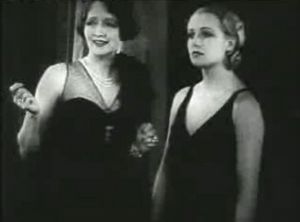
In 1913, she became the fifth wife of DeWolf Hopper, whose previous wives were named Ella, Ida, Edna and Nella. The similarity in names caused some friction, as he would sometimes call Elda by the name of one of his former wives. Consequently, Elda Hopper paid a numerologist $10 to tell her what name she should use, and the answer was "Hedda". She began acting in silent movies in 1915. Her motion picture debut was in The Battle of Hearts (1916) with William Farnum, but she made a major splash in Virtuous Wives (1918), in which she established her pattern of playing society women. Hopper decided to upstage the film's headline starlet, Anita Stewart, by spending all of her $5,000 salary on a lavish wardrobe from the upscale boutique Lucile, which she wore in the film. By 1920, she was commanding $1,000 per week as a free agent in New York; in 1923 she moved to Hollywood and became a contract player for Louis B. Mayer Pictures. She appeared in more than 120 movies over her 23 year acting career.
Writing
As Hopper's movie career waned in the mid-1930s, she looked for other sources of income. In 1935, she agreed to write a weekly Hollywood gossip column for The Washington Herald at $50 a week (equivalent to $1,067 in 2022), which was cancelled after four months when she refused to take a $15 pay cut.
In 1937, Hopper was offered another gossip column opportunity, this time with the Los Angeles Times. Her column, entitled "Hedda Hopper's Hollywood", debuted on February 14, 1938. Hopper could not type, nor spell very well, so she dictated her column to a typist over the phone. Hopper used her extensive contacts forged during her acting days to gather material for her column.
Part of Hopper's public image was her fondness for wearing extravagant hats, for which the Internal Revenue Service gave her a $5,000 annual tax credit as a work expense. During the Second World War, the Nazis used photographs of Hopper in her extravagant hats for propaganda, as a symbol of "American decadence". Her annual income was $250,000, enabling her to live an upscale lifestyle and maintain a mansion in Beverly Hills, which she described as "the house that fear built".
Hopper was an advocate for actress Joan Crawford, whose career suffered in the early 1940s after she was labelled "Box-Office Poison" and forced to resign from Metro-Goldwyn-Mayer. In 1945, Hopper reprinted a press release for Mildred Pierce in her column, which described Crawford as a leading contender for the Best Actress Oscar. Such was Hopper's influence that she was credited with swinging the decision in Crawford's favor when she won the award. Hopper's support has been described as the first instance of lobbying the Academy of Motion Picture Arts and Sciences to favor a certain nominee.
Actress ZaSu Pitts compared Hopper to "a ferret".
Joan Bennett sent Hopper a "$435 valentine. The $35 went for a skunk which carried a note: 'Won't you be my valentine? Nobody else will. I stink and so do you.'" Hopper reportedly commented that the skunk was beautifully behaved. She called it Joan, and passed it on to actor James Mason and his wife as a present, as they had made the first bid after the story about the unusual gift made the news.
During World War II, Hopper's only child, actor William "Bill" Hopper, served in the Navy in Underwater Demolitions. She chastised Douglas Fairbanks Jr., the son of her old friend Douglas Fairbanks, because she thought the younger Fairbanks was shirking his duty to his country. Fairbanks Jr. recalled in his memoirs Salad Days that he was already in uniform serving in the United States Navy, and despised Hopper for her insinuations.
In 1963, Hopper complained in her column that three out of five Best Actor Oscar nominees were British and only two were American: "The weather's so foul on that tight little isle that, to get in out of the rain, they all gather in theatres and practise Hamlet on each other."
Feud with Louella Parsons
When Hopper had initially come to Hollywood, she and Louella Parsons had a mutually beneficial arrangement. Hopper was then a moderately successful actress, and according to Parson's successor, Dorothy Manners, if anything scandalous happened on a set, Hedda would give Louella a call. In return, Hedda was guaranteed a few lines of copy under Louella's increasingly influential byline.
After MGM canceled her contract, Hopper struggled to maintain her career as an actress. She was offered a position as a Hollywood columnist by the Esquire Feature Syndicate due to a recommendation by Andy Hervey of MGM’s publicity department.
One of the first papers to pick up “Hedda Hopper’s Hollywood” was the Los Angeles Times, a morning paper like Louella's Examiner. Hopper first publicly scooped Parsons with the divorce of the president's son Jimmy Roosevelt (a Goldwyn employee) from his wife, Betsey. The story became front-page news across the country.
Citizen Kane
When rumors began to surface that Orson Welles debut film Citizen Kane was inspired by Hearst's life, Parsons lunched with the director, and believed his evasions and denials. Hopper arrived uninvited to an early screening of the film and wrote a scathing critique, calling it a "vicious and irresponsible attack on a great man". As a result, Hearst sent Parsons a letter complaining that he had learned about Citizen Kane from Hopper, and not her.
On the warpath, Parsons then demanded a private screening of the film, and threatened RKO chief George Schaefer on Hearst's behalf, first with a lawsuit, and then with a vague but powerful threat of consequences for everyone in Hollywood. On January 10, Parsons and two lawyers working for Hearst were given a private screening of the film. Horrified by what she saw, Louella rushed out of the studio screening room to cable Hearst, who telegraphed back the terse message "Stop Citizen Kane". Soon after, Parsons called Schaefer and threatened RKO with a lawsuit if they released Kane. She also warned other studio heads that she would expose the private lives of people throughout the industry and reveal long-suppressed scandalous information.
When Schaefer—who had also been threatened by Hearst with legal action—announced that Citizen Kane was scheduled to premiere in February 1941 at Radio City Music Hall, Parsons contacted the manager of Radio City Music Hall and advised him that exhibiting the film would result in a press blackout. The premiere was canceled. Other exhibitors were fearful of being sued by Hearst and refused to show the film. As a result, despite support from Hearst adversaries such as Henry Luce, on release overall the film lost money. Parsons was by no means alone in her campaign against Citizen Kane but Welles never quite recovered his position in Hollywood afterward.
Ingrid Bergman
In the early 1950s, the Los Angeles Examiner ran on its front page above Parsons's byline: "Ingrid Bergman Baby Due in Three Months at Rome". Bergman had left her husband, neurologist Peter Lindstrom, to live in Italy with director Roberto Rossellini, but the news that she might be pregnant was met with some skepticism. Bergman was well known for the angelic role of Sister Benedict in The Bells of St. Mary's.
Hopper, who had been a public supporter of Bergman, had believed the actress' denial of the pregnancy, and printed a fervent repudiation of the rumor. However, Bergman was indeed pregnant and Hopper, enraged at being scooped, launched a PR campaign decrying Bergman for being pregnant out of wedlock, and carrying a married man's child. Parsons had allegedly received the tip from Howard Hughes, who was incensed at Bergman for being unable to shoot a film for him as promised.
Reaction
Reportedly, whereas Hopper was more inclined to see their much-publicized antagonism as funny and good for business, Parsons took it personally and saw Hopper as a rival in every possible way.
It has been suggested that Hopper was set up as a columnist by Louis B. Mayer (with the blessing of other studio chiefs) to offset Louella's monopolistic power. Gossip columnist Liz Smith, stated that: "The studios created both of them. And they thought they could control both of them. But they became Frankenstein monsters escaped from the labs." Hopper and Parsons had a combined readership of 75 million in a country of 160 million.
Politics
Hopper was a fervent Republican. During the 1944 presidential election, for instance, she spoke before a massive rally organized by David O. Selznick in the Los Angeles Coliseum in support of the Dewey-Bricker ticket, as well as Governor Earl Warren of California, who later became Dewey's running mate in 1948, and later the Chief Justice of the United States. The gathering drew 93,000, with Cecil B. DeMille as the master of ceremonies, and Walt Disney as one of the speakers. Others in attendance included Ronald Reagan, Barbara Stanwyck, Ann Sothern, Ginger Rogers, Randolph Scott, Adolphe Menjou, Dick Powell, Gary Cooper, Edward Arnold, and William Bendix. Despite the good turnout at the rally, most Hollywood celebrities who took a public position sided with the Roosevelt-Truman ticket.
Hopper strongly supported the House Un-American Activities Committee (HUAC) hearings, and was a guest and speaker of the Women's Division at the 1956 Republican National Convention held in San Francisco to renominate the Eisenhower–Nixon ticket.
She was so well known for her conservatism that rumor had it she planned to stand up, unfurl an American flag, and walk out of the 23rd Academy Awards ceremony in March 1951 if Jose Ferrer, who was known to be a socialist, should win Best Actor. The rumor was untrue, but Hopper joked that she wished she had thought of it. Screenwriter Jay Bernstein related that when he told Hopper that many people in Hollywood privately called her a Nazi because of her extreme conservatism, the gossip columnist began to cry and replied: "Jay, all I've ever tried to be is a good American."
Blacklisting
Hopper was one of the driving forces behind the creation of the Hollywood blacklist, using her 35 million strong readership to destroy the careers of those in the entertainment industry whom she suspected of being a Communist, having Communist sympathies, being homosexual, or leading dissolute lives. She was a leading member of the Motion Picture Alliance for the Preservation of American Ideals, founded in 1944 and devoted to rooting out suspected Communists in Hollywood. She considered herself to be a guardian of moral standards in Hollywood.
One of Hopper's victims was screenwriter Dalton Trumbo, who was blacklisted throughout the late 1940s and 1950s partially through Hopper's consistently negative coverage of his Communist Party membership. When actor Kirk Douglas hired Trumbo to write the screenplay for Spartacus (1960), Hopper denounced the film in her column, stating that "[the script is based on] a book written by a Commie and the screen script was written by a Commie, so don't go see it." The film was a critical and financial success.
The list of Hopper's targets also included Charlie Chaplin and Ingrid Bergman.
Radio and television
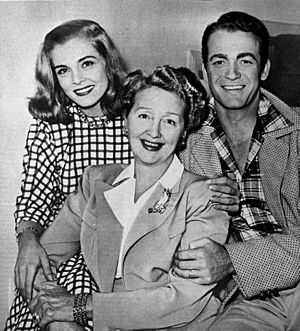
Hopper had an acting role in a radio soap opera, playing Portia Brent on the Blue Network's Brenthouse beginning in February 1939. She debuted as host of her own radio program, The Hedda Hopper Show, November 6, 1939. Sponsored by Sunkist, she was heard on CBS three times a week for 15 minutes until October 30, 1942. From October 2, 1944, to September 3, 1945, Armour Treet sponsored a once-a-week program. On September 10, 1945, she moved to ABC, still sponsored by Armour, for a weekly program that continued until June 3, 1946. Hopper moved back to CBS beginning on October 5, 1946 with a weekly 15-minute program, This Is Hollywood, sponsored by Procter & Gamble. It ran until June 28, 1947.
Expanding to 30 minutes on NBC, she was host of a variety series, The Hedda Hopper Show, broadcast from October 14, 1950, to November 11, 1950 on Saturdays, then from November 19, 1950, to May 20, 1951 on Sundays. This program featured music, talk and dramatized excerpts from movies with well-known guests, such as Broderick Crawford reprising a scene from All the King's Men (1949).
On January 10, 1960, a television special, Hedda Hopper's Hollywood, aired on NBC. Hosted by Hopper, guest interviews included a remarkably eclectic mix of past, current and future stars: Lucille Ball (a longtime friend of Hopper), Francis X. Bushman, Liza Minnelli, John Cassavetes, Robert Cummings, Marion Davies (her last public appearance), Walt Disney, Janet Gaynor, Bob Hope, Hope Lange, Anthony Perkins, Debbie Reynolds, James Stewart, and Gloria Swanson.
Hopper had several acting roles during the latter part of her career, including brief cameo appearances as herself in the movie Sunset Boulevard (1950) and The Patsy (1964), as well as episodes of I Love Lucy, The Ford Show, Starring Tennessee Ernie Ford, and The Beverly Hillbillies, starring Buddy Ebsen. Her autobiography, From Under My Hat (Doubleday, 1952) was followed by The Whole Truth and Nothing But (1962), also published by Doubleday. She remained active as a writer until her death, producing six daily columns and a Sunday column for the Chicago Tribune syndicate, as well as writing articles for celebrity magazines such as Photoplay.
Personal life
On May 8, 1913, Hopper married actor and singer DeWolf Hopper in New Jersey. They had one child, William, who later played Paul Drake in the Perry Mason series. The couple divorced in 1922.
Death
Hopper died on February 1, 1966, of double pneumonia at the age of 80 in Cedars-Sinai Medical Center in Los Angeles. The probate value of Hopper's estate was $472,661 gross and $306,679 net. She is buried at Rose Hill Cemetery, Altoona, Pennsylvania.
For her contribution to the motion picture industry, Hopper has a star on the Hollywood Walk of Fame at 6313½ Hollywood Boulevard in Hollywood.
Filmography
| Year | Title | Role | Notes |
|---|---|---|---|
| 1916 | The Battle of Hearts | Maida Rhodes | Lost film Credited as Elda Furry |
| 1917 | Her Excellency, the Governor | Sylvia Marlowe | Lost film Credited as Elda Milar |
| 1917 | The Food Gamblers | June Justice | Lost film |
| 1917 | Seven Keys to Baldpate | Myra Thornhill | Credited as Elda Furry |
| 1917 | Nearly Married | Hattie King | abridged version extant |
| 1918 | The Beloved Traitor | Myrna Bliss | |
| 1918 | By Right of Purchase | Society Woman | Incomplete print Uncredited |
| 1918 | Virtuous Wives | Irma Delabarre | Lost film Credited as Mrs. DeWolf Hopper |
| 1919 | The Third Degree | Mrs. Howard Jeffries, Sr | Lost film |
| 1919 | Sadie Love | Mrs. James Wakeley | Lost film |
| 1919 | The Isle of Conquest | Mrs. Harmon | Lost film |
| 1920 | The Man Who Lost Himself | Countess of Rochester | Lost film |
| 1920 | The New York Idea | Vida Phillimore | |
| 1921 | Heedless Moths | His Wife | Lost film |
| 1921 | The Inner Chamber | Mrs. Candor | Lost film Credited as Mrs. DeWolf Hopper |
| 1921 | Conceit | Mrs. Agnes Crombie | Credited as Mrs. DeWolf Hopper |
| 1922 | Sherlock Holmes | Madge Larrabee | |
| 1922 | What's Wrong with the Women? | Mrs. Neer | Lost film Credited as Mrs. DeWolf Hopper |
| 1922 | Women Men Marry | Eleanor Carter | |
| 1923 | Has the World Gone Mad! | Mrs. Adams | Lost film |
| 1923 | Reno | Mrs. Kate Norton Tappan | |
| 1924 | Gambling Wives | Madame Zoe | Lost film |
| 1924 | Why Men Leave Home | Nina Neilson | |
| 1924 | Happiness | Mrs. Chrystal Pole | |
| 1924 | Miami | Mary Tate | Lost film |
| 1924 | Another Scandal | Cousin Elizabeth MacKenzie | Lost film |
| 1924 | Sinners in Silk | Mrs. Stevens | Lost film |
| 1924 | The Snob | Mrs. Leiter | Lost film |
| 1925 | Her Market Value | Mrs. Bernice Hamilton | |
| 1925 | Declassée | Lady Wildering | |
| 1925 | Dangerous Innocence | Muriel Church | Lost film |
| 1925 | Zander the Great | Mrs. Caldwell | |
| 1925 | Raffles, the Amateur Cracksman | Mrs. Clarice Vidal | |
| 1925 | The Teaser | Margaret Wyndham | Lost film |
| 1925 | Borrowed Finery | Mrs. Bordon | |
| 1926 | Dance Madness | Valentina | Lost film |
| 1926 | The Caveman | Mrs. Van Dream | |
| 1926 | Pleasures of the Rich | Mona Vincent | Lost film |
| 1926 | Skinner's Dress Suit | Mrs. Colby | |
| 1926 | Lew Tyler's Wives | Virginia Philips | Lost film |
| 1926 | The Silver Treasure | Mrs. Gould | Lost film |
| 1926 | Don Juan | Marchesia Rinaldo | |
| 1926 | Fools of Fashion | Countess de Fragni | |
| 1926 | Obey The Law | Society Woman | |
| 1927 | Orchids and Ermine | The Modiste | |
| 1927 | Venus of Venice | Jean's Mother | |
| 1927 | Children of Divorce | Katherine Flanders | |
| 1927 | Matinee Ladies | Mrs. Aldrich | Lost film |
| 1927 | Wings | Mrs. Powell | Uncredited |
| 1927 | Black Tears | Lost film | |
| 1927 | The Cruel Truth | Grace Sturdevant | |
| 1927 | Adam and Evil | Eleanor Leighton | Lost film |
| 1927 | One Woman to Another | Olive Gresham | Lost film |
| 1927 | The Drop Kick | Mrs. Hamill | |
| 1927 | A Reno Divorce | Hedda Frane | Lost film |
| 1927 | French Dressing | Lost film, Uncredited | |
| 1928 | Love and Learn | Mrs. Ann Blair | Lost film |
| 1928 | The Whip Woman | Countess Ferenzi | Lost film |
| 1928 | The Port of Missing Girls | Mrs. C. King | |
| 1928 | The Chorus Kid | Mrs. Garrett | Lost film |
| 1928 | Harold Teen | Mrs. Hazzit | |
| 1928 | Green Grass Widows | Mrs. Worthing | Extant BFI London |
| 1928 | Runaway Girls | Mrs. Hartley | Lost film |
| 1928 | Companionate Marriage | Mrs. Moore | Lost film |
| 1929 | The Last of Mrs. Cheyney | Lady Maria | |
| 1929 | His Glorious Night | Mrs. Collingswood Stratton | |
| 1929 | Half Marriage | Mrs. Page | |
| 1929 | The Racketeer | Mrs. Karen Lee | |
| 1929 | A Song of Kentucky | Mrs. Coleman | Lost film |
| 1930 | Such Men Are Dangerous | Muriel Wyndham | |
| 1930 | High Society Blues | Mrs. Divine | |
| 1930 | Murder Will Out | Aunt Pat | |
| 1930 | Holiday | Susan Potter | |
| 1930 | Let Us Be Gay | Madge Livingston | |
| 1930 | Our Blushing Brides | Mrs. Weaver | |
| 1930 | War Nurse | Matron | |
| 1931 | The Easiest Way | Mrs. Clara Williams | Uncredited |
| 1931 | The Prodigal | Christine | |
| 1931 | Men Call It Love | Callie | |
| 1931 | A Tailor Made Man | Mrs. Stanlaw | |
| 1931 | Shipmates | Auntie | |
| 1931 | The Common Law | Mrs. Clare Collis | |
| 1931 | The Mystery Train | Mrs. Marian Radcliffe | |
| 1931 | Rebound | Liz Crawford | |
| 1931 | Flying High | Mrs. Smith | |
| 1931 | West of Broadway | Mrs. Edith Trent | |
| 1931 | Good Sport | Mrs. Atherton | |
| 1932 | The Man Who Played God | Mrs. Alice Chittendon | |
| 1932 | Night World | Mrs. Rand | |
| 1932 | As You Desire Me | Ines Montari | |
| 1932 | Skyscraper Souls | Ella Dwight | |
| 1932 | Downstairs | Countess De Marnac | |
| 1932 | Speak Easily | Mrs. Peets | |
| 1932 | The Unwritten Law | Jean Evans | |
| 1933 | Men Must Fight | Mrs. Chase | |
| 1933 | The Barbarian | Mrs. Loway, American Tourist | |
| 1933 | Pilgrimage | Mrs. Worth (Gary Worth's mother) | |
| 1933 | Beauty for Sale | Madame Sonia Barton | |
| 1934 | Bombay Mail | Lady Daniels | |
| 1934 | Let's Be Ritzy | Mrs. Burton | |
| 1934 | Little Man, What Now? | Nurse | |
| 1934 | No Ransom | Mrs. John Winfield | |
| 1935 | One Frightened Night | Laura Proctor | |
| 1935 | Society Fever | Mrs. Vandergriff | |
| 1935 | Lady Tubbs | Mrs. Ronald Ash-Orcutt | |
| 1935 | Alice Adams | Mrs. Palmer | |
| 1935 | I Live My Life | Alvin's Mother | |
| 1935 | Three Kids and a Queen | Mrs. Cummings | |
| 1935 | Ship Cafe | Tutor | |
| 1936 | The Dark Hour | Mrs. Tallman | |
| 1936 | Doughnuts and Society | Mrs. Murray Hill | |
| 1936 | Dracula's Daughter | Lady Esme Hammond | |
| 1936 | Bunker Bean | Mrs. Dorothy Kent | |
| 1937 | You Can't Buy Luck | Mrs. Agnes White | |
| 1937 | Dangerous Holiday | Lottie Courtney | |
| 1937 | Topper | Mrs. Grace Stuyvesant | |
| 1937 | Artists and Models | Mrs. Townsend | |
| 1937 | Vogues of 1938 | Mrs. Van Klettering | Uncredited |
| 1937 | Nothing Sacred | Dowager on Ship | Uncredited |
| 1938 | Tarzan's Revenge | Penny Reed | |
| 1938 | Maid's Night Out | Mrs. Harrison | |
| 1938 | Dangerous to Know | Mrs. Emily Carson | |
| 1938 | Thanks for the Memory | Polly Griscom | |
| 1939 | Midnight | Stephanie | |
| 1939 | The Women | Dolly Dupuyster | |
| 1939 | What a Life | Mrs. Aldrich | |
| 1939 | That's Right – You're Wrong | Herself – Newspaper Columnist | Uncredited |
| 1939 | Laugh It Off | Elizabeth "Lizzie" Rockingham | |
| 1940 | Queen of the Mob | Mrs. Emily Sturgis | |
| 1940 | Cross-Country Romance | Mrs. North | |
| 1941 | Life with Henry | Mrs. Aldrich | |
| 1941 | I Wanted Wings | Mrs. Young | Uncredited |
| 1942 | Reap the Wild Wind | Aunt Henrietta Beresford | |
| 1950 | Sunset Boulevard | Herself | |
| 1960 | Pepe | Herself, Cameo appearance | |
| 1961 | The Right Approach | Newspaper Columnist | Uncredited |
| 1964 | The Patsy | Herself | |
| 1966 | The Oscar | Herself |
| Year | Title | Role | Notes |
|---|---|---|---|
| 1951–1963 | What's My Line? | Herself – Mystery Guest | 7 episodes |
| 1953 | Goodyear Television Playhouse | Hostess | Episode: "A. Fadeout" |
| 1955 | I Love Lucy | Herself | Episode: "The Hedda Hopper Story" |
| 1955 | The Colgate Comedy Hour | Herself – Gossip Columnist | 2 episodes |
| 1956 | The Bob Hope Show | Herself | 2 episodes |
| 1956 | The Tennessee Ernie Ford Show | Herself | Episode #1.19 |
| 1957 | Playhouse 90 | Various roles | 2 episodes |
| 1957 | The Lucy–Desi Comedy Hour | Herself | Episode: "Lucy Takes a Cruise to Havana" |
| 1958 | The Garry Moore Show | Herself | Episode #1.5 |
| 1959 | Small World | Herself | Episode #2.8 |
| 1959 | Westinghouse Desilu Playhouse | Herself | Episode: "The Desilu Revue" |
| 1960 | Hedda Hopper's Hollywood | Host | Television special |
| 1960 | The Steve Allen Show | Herself | Episode: "The Movie Premiere of 'Can-Can'" |
| 1961 | Here's Hollywood | Herself | October 31, 1961 episode |
| 1964 | The Beverly Hillbillies | Herself | Episode: "Hedda Hopper's Hollywood" |
| 1966 | The New Alice in Wonderland | Hedda, the Mad Hatter | Voice, TV movie, (final film role & posthumous release) |
See also
 In Spanish: Hedda Hopper para niños
In Spanish: Hedda Hopper para niños
- Jimmie Fidler


